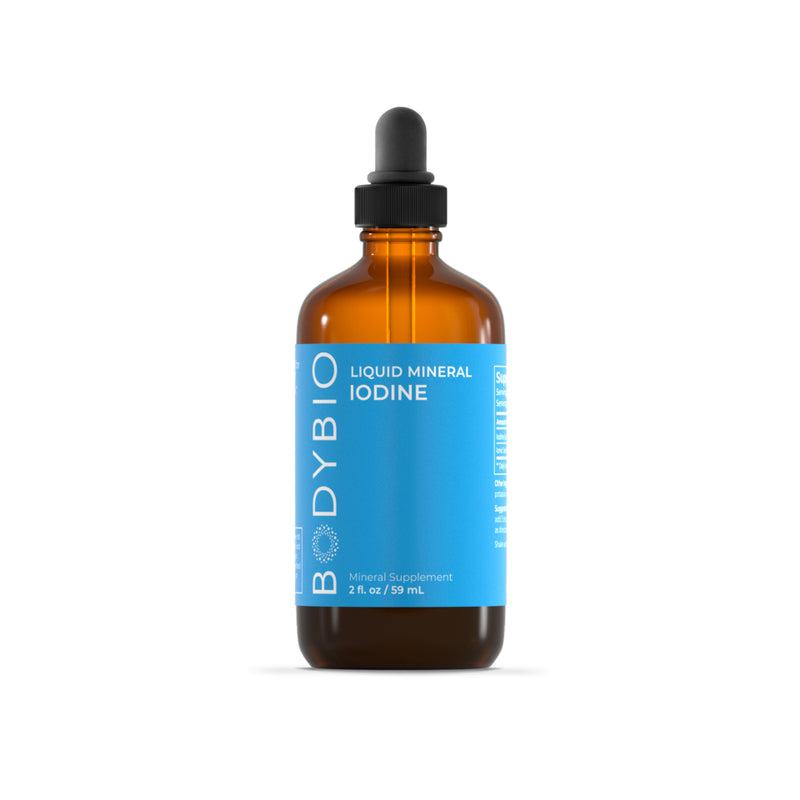How to Recognize Iodine Deficiency and What You Can Do About It
Key Takeaways:
Key Points:
- Iodine may be one of the most misunderstood micronutrients in the body, but it’s essential for regulating thyroid health, hormone health, and energy production.
- Iodine supplementation through table salt is popular, but the best way to get iodine is through more natural sources and strategic supplementation where necessary.
- Your cells need iodine in order to turn food into energy. This is why a slow metabolism is a common symptom of iodine deficiency.
This Underrated Mineral May Be Key to Improving Hormone Function, Cognition, and Metabolism
Iodine may be the most misunderstood mineral in the human body. While we are taught that it’s essential to our health and wellbeing (and protects against goiters, aka swelling in the neck), we don’t have a detailed grasp on how iodine works in our bodies and what organs and systems it supports.
According to studies, about thirty percent of the world’s population is at risk for iodine deficiency. Many deficiency symptoms go unnoticed — and getting enough iodine in your diet can be difficult with depleted soil and lack of education around iodine inclusive foods.
Interestingly, people who believe they are eating a healthy diet are among the most susceptible to iodine deficiency, since they completely eliminate iodized salt from their diet but don’t replace that lost (albeit inferior quality) iodine with another source.
In this article, we’ll help you understand iodine deficiency and what to do about it.
Table of Contents:
- The Role Iodine Deficiency Plays in Your Thyroid
- 5 Telltale Symptoms of Iodine Deficiency
- How to Diagnose an Iodine Deficiency
- Sources of Iodine
- Should You Supplement Iodine?
- Iodine and Your Cells
The Role Iodine Deficiency Plays in Your Thyroid
Why You May Need to Take Iodine for Thyroid Complications
Iodine does a number of things in the human body, but its main role is to help regulate the thyroid. Since iodine controls your thyroid function, and your thyroid controls your hormones, this makes iodine an essential micronutrient for hormone regulation and efficiency.
Low levels of iodine can greatly affect your thyroid and may put you at risk for illnesses like hypothyroidism and breast cancer (yep, iodine is needed for breast tissue development!). Iodine is also essential for human growth and development, making stable iodine levels essential for healthy pregnancies and women of reproductive age.
Without sufficient iodine in the body, your thyroid can’t produce T1, T2, T3, or T4 thyroid hormones. Meaning, iodine deficiency may be the root cause of a number of thyroid issues and should be considered as part of any hormone-related treatment or therapy.
Why Iodine Deficiency Is On the Rise
In the 1920s, the United States in particular had an iodine deficiency problem. Switzerland developed a way to fortify table salt with iodine — so that people across the globe could get their recommended dosage and put rampant deficiency symptoms into remission.
While this idea once revolutionized healthcare in many ways, there are some areas where iodine deficiency risks are still very real. For one, unrefined salt options like Himalayan salt, sea salt, and Redmond’s Real salt (our favorite!), aren’t fortified with iodine. Many people are cutting out table salt from their diet, but they aren’t replacing that lost iodine.
It’s always better to get iodine from its most natural source (namely, food). Supplementation should be used only when iodine rich foods are inaccessible or inadequate for therapeutic purposes.
5 Telltale Symptoms of Iodine Deficiency
Iodine deficiency can be sneaky — some symptoms may be far more subtle than you think. Here are five telltale signs you may be struggling with iodine deficiency.
1) Swelling In The Neck (Aka, a Goiter)
The most obvious symptom of iodine deficiency is what’s called a goiter. A goiter is a lump that protrudes from the neck when the thyroid swells (usually due to chronic stress on the thyroid, which depletes iodine and other essential minerals). While this symptom is infamously associated with iodine deficiency, it usually only occurs in the most severe cases. Just because you don’t have a goiter doesn’t mean you don’t have iodine deficiency. Most goiters aren’t permanent and can be treated easily with an iodine supplement.
2) Sensitivity to Cold
If you’re always wearing a sweater and feel like you can’t get warm, it may be time to check out iodine deficiency. Why? In short, the thyroid controls the metabolism — and iodine controls thyroid performance. If your metabolism is running slow, you’ll have more difficulty regulating your body temperature.
3) Brain Fog
According to scientific research, iodine deficiency is the greatest single cause of preventable brain damage in the world. Typically, this damage occurs in utero or during early childhood development.
However, iodine deficiency can still affect adults in more subtle ways, particularly with brain fog. Without enough iodine, your body struggles to produce and regulate hormones like T3 and T4 (which help to regulate neurotransmitters in the brain and promote cognition).
If the problem is chronic, thyroid stimulating hormone (TSH) secretion is heightened to cope with the thyroid’s increasing workload. High TSH levels have been associated with brain fog and could also raise your risk for dementia.
4) Slowed Heartbeat or Heart Palpitations
Did you know? Heart issues are common in people who have hormone dysregulation. This can be a sign of a number of deficiencies — including iodine and magnesium.
5) Unexplained Weight Gain
If you keep cringing at the number on the scale, but aren’t consuming the extra calories to show for it, the problem might not be your dietary habits. Iodine deficiency is commonly associated with slowed metabolism. When your body isn’t burning energy as efficiently as it could be, unexplained weight gain can be one of the side-effects.
How to Diagnose an Iodine Deficiency
Diagnosing an iodine deficiency can be tricky — since many of the symptoms mirror those of hormone imbalances and thyroid dysfunction. Typically, a blood test or a hair mineral analysis test will be the best way to diagnose an iodine deficiency. Since you may not yet know the root cause of your symptoms, it’s worthwhile to do a full thyroid panel with functional lab ranges.
Sources of Iodine
The body can’t make iodine on its own, which is why it's so vital that you have good sources of iodine through food and supplementation.
Sources of Iodine in Foods
Getting your recommended daily intake of iodine is easier than you think. These sources of iodine in foods will help keep your thyroid in working order — and your hormones well balanced.
- Seaweed. Even Hippocrates documented the decrease of goiter symptoms in patients who consumed seaweed.
- Fish and shellfish. Any foods sourced in or around the ocean are likely to have ample levels of iodine in them.
- Dairy foods. Milk is accessible to most people in the modern world, and one glass contains almost 50% of the daily recommended iodine intake (if you tolerate dairy, of course).
- Liver. Although many people cringe at the idea of liver (from beef or chicken), the benefits far outweigh the unfamiliar taste. Liver is extremely rich in vitamins and minerals — including iodine. If the idea of eating liver is too gross, you can get it in freeze-dried supplement form.
Should You Supplement Iodine?
Supplementation is another great way to get a daily dose of iodine into your system, but requires careful monitoring since too much iodine can be problematic too.
Since liquid minerals allow you to absorb iodine easily, this is what we recommend for iodine supplementation. To test and see if you need more iodine, drop the recommended drops of liquid iodine into a glass of water. Drink and observe the taste. If it tastes sweet, pleasant, or like nothing at all — then you probably need some iodine supplementation (or an increase of iodine-rich foods). If the liquid mineral tastes bitter, then your body is already balanced and has enough iodine.
One of the benefits of liquid minerals is that they allow you to re-test a few months after beginning supplementation to see if your body needs more, less, or if you can stop with additional iodine. You can complete this test any time along your supplementation protocol. At some point, if you detect a bitter taste from the iodine, you’ll know it’s time to stop supplementation.
Another thing to note about iodine supplementation is that free calcium can block thyroid iodine receptors in some sick patients. Because of this, an iodine supplement may not actually reach the thyroid. If this is something you suspect, it’s best to work with your doctor to identify the best treatment plan.
Iodine and Your Cells
Want to know how iodine deficiency trickles down to the cell? When we talk about poor metabolism and how it relates to iodine presence in the body, what we’re really talking about is energy conversion in your cells. The cells need iodine in order to convert food into energy. Without iodine, the food to energy conversion slows. Weight gain may occur, alongside other uncomfortable symptoms like the inability to handle cold temperatures.
Iodine also plays a key role in skin cell regeneration (which is triggered by the thyroid). Many patients who experience iodine deficiency also experience skin issues — particularly dry skin.
BodyBio Is Here to Help Address Iodine Deficiency
Learn more about our Liquid Iodine Trace Mineral.
Andersson, M., Takkouche, B., Egli, I., Allen, H. E., & de Benoist, B. (2005). Current global iodine status and progress over the last decade towards the elimination of iodine deficiency. Bulletin of the World Health Organization, 83(7), 518–525.
Hwalla, N., Al Dhaheri, A. S., Radwan, H., Alfawaz, H. A., Fouda, M. A., Al-Daghri, N. M., Zaghloul, S., & Blumberg, J. B. (2017). The Prevalence of Micronutrient Deficiencies and Inadequacies in the Middle East and Approaches to Interventions. Nutrients, 9(3), 229. https://doi.org/10.3390/nu9030229
Leung, A. M., Braverman, L. E., & Pearce, E. N. (2012). History of U.S. iodine fortification and supplementation. Nutrients, 4(11), 1740–1746. https://doi.org/10.3390/nu4111740
Panth, P., Guerin, G., & DiMarco, N. M. (2019). A Review of Iodine Status of Women of Reproductive Age in the USA. Biological trace element research, 188(1), 208–220. https://doi.org/10.1007/s12011-018-1606-5
Roseland, J. M., Phillips, K. M., Patterson, K. Y., Pehrsson, P. R., Bahadur, R., Ershow, A. G., & Somanchi, M. (2020). Large Variability of Iodine Content in Retail Cow's Milk in the U.S. Nutrients, 12(5), 1246. https://doi.org/10.3390/nu12051246
Rappaport J. (2017). Changes in Dietary Iodine Explains Increasing Incidence of Breast Cancer with Distant Involvement in Young Women. Journal of Cancer, 8(2), 174–177. https://doi.org/10.7150/jca.17835
Delange F. (2001). Iodine deficiency as a cause of brain damage. Postgraduate medical journal, 77(906), 217–220. https://doi.org/10.1136/pmj.77.906.217





